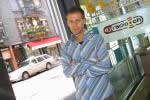
| Media Rules and Rulers |
 |
followthemedia.com - a knowledge base for media professionals |
|
|
AGENDA
|
||
New Youth Station Licensed to ZürichAfter 18 months of proposals, counter-proposals, discussions and more discussions the Swiss government approved a license for a new radio station for young people in Zürich.The successful applicant, DJRADIO, has operated as an Internet radio station for four years. Founder and managing director Egon Blatter called the favorable decision by the Federal Department for Environment, Transport, Energy and Communications (DETEC) for his “innovative” proposal “simply ingenious.”
DETEC granted the concession December 14, 2004, including BAKOMs recommendations as specific conditions. DETEC is the parliamentary agency that licenses Swiss public services. BAKOM is the telecommunications regulator.
DETEC was swayed by DJRADIO’s association with the Institute for Applied Media at the University of Zürich at Winterthur. Students will fill the airwaves as well as take practical courses in broadcasting at the stations yet to be built facilities. Calls for a Zürich youth-oriented radio station have been raised for several years. Only five stations are licensed to metropolitan Zürich, with a population of just over 1 million (2000). Public broadcaster Schweizer Radio (SR DRS) provides three channels on FM and one on MW specific to the Swiss German speaking cantons but not specific to Zürich. The audience for SR DRS3, nominally the public FM channel for younger people, has migrated to “young” people 30 years and older. SR DRS created another channel for even younger listeners, called Virus, in 1999. It was originally a cable-caster and now heard, as well, on DAB throughout Swiss German speaking eastern Switzerland. One of the five, non-commercial community Radio LoRa, launched a program hosted by two teenagers called “Youth Radio” in May 2003. During the process of selecting a licensee, the whole range of civic and political interests were voiced. Entering the debate after BAKOM asked for proposals, the Zürich city council asked that the new station emphasize education more and music less and generally preferred the DJRADIO proposal. The Association of Swiss Private Radio (VSP – Verband Schweizer Privatradios) strongly opposed BAKOM’s decision to create a youth station in Zürich. VSP spokesperson Frederik Stucki said, “This has been, is and will continue to be a problematic issue for commercial broadcasters.” Commercial broadcasters fear any new commercial competitor might negatively affect their revenues. Swiss radio ad revenues continue to increase, modestly, but have not recovered from the Europe-wide slump since 2001. Swiss radio ad revenue for 2003 was CHF 127m (€80m). Zürich radio ad revenue is estimated at between CHF 35-40m. FM frequency allocations for new and existing stations has been highly contentious. BAKOM has maintained that new frequencies are not available while applicants for new stations, conducting independent technical studies, reveal otherwise. Says Stucki, “Before awarding new FM-frequencies to new competitors, additional frequencies should be granted for existing stations which still have "black-holes" in their transmission area.” BAKOM has attempted several corrections in response private broadcasters signal coverage complaints, typically granting low-power adjacent frequencies. Commercial broadcasters say BAKOM has allowed the public broadcaster SRG-SSR to “hoard” FM frequencies in advance of revisions of the Swiss radio and television law (RTVL) which would limit SRG-SSR to 60% of available spectrum. Of the losing applicants for the youth station concession, one has promised to take the fight to the Upper House of the Swiss Parliament. Basel cable-broadcaster Radio 105 has long, and unsuccessfully, searched for an FM concession. Manager Giuseppe Scaglione called the decision approving the DJRADIO proposal a “scandal.”  Egon Blatter |
| copyright ©2004-2006 ftm partners, unless otherwise noted | Contact Us • Sponsor ftm |